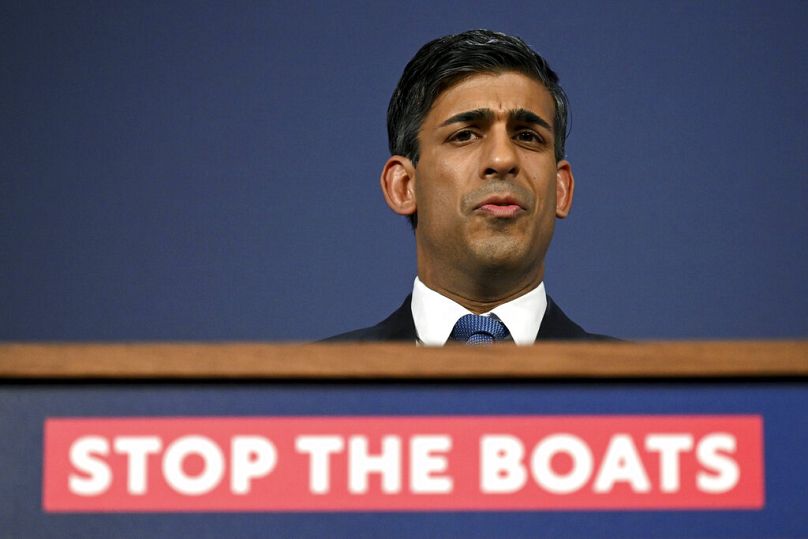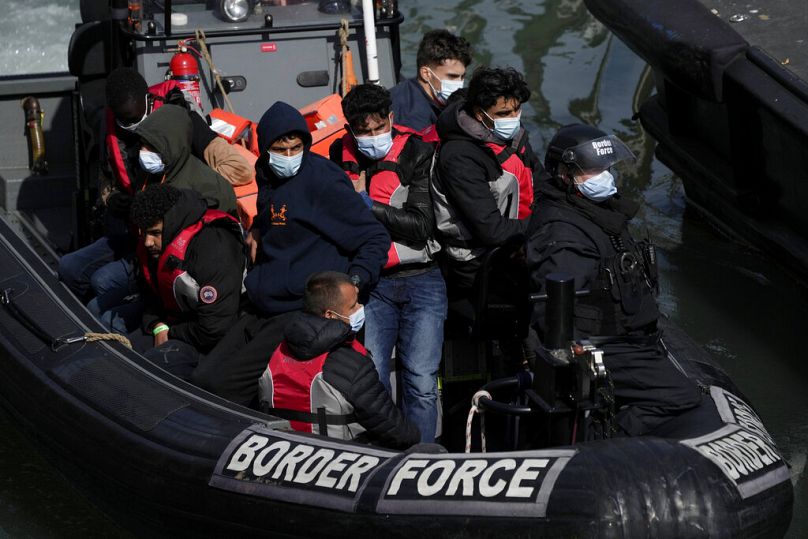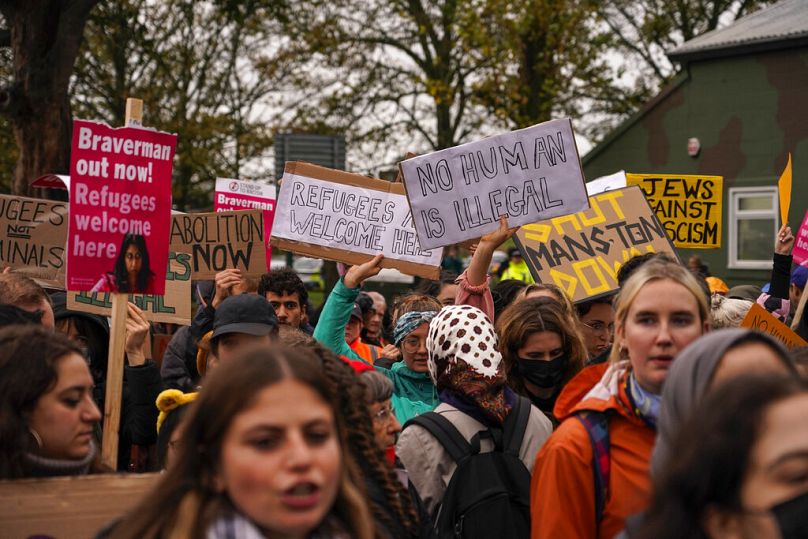Perhaps the real reason we face a permacrisis is that some people benefit from it, including the politicians who like to present complex and nuanced issues in this simplified way – as problems that they can offer to "control", Rob McNeil writes.
Working on UK immigration policy issues over the last decade has been something of a wild ride.
It started with the "net migration target", a policy pledge to reduce net migration to the "tens of thousands" – which the Government didn’t have the tools to achieve.
This failure fed into a perception that migration – particularly from the EU – was “out of control” and proved decisive in the UK’s Brexit vote.
After Brexit, migration became less of a hot-button issue for a while.
It was an odd experience for those of us who were used to our phones ringing all day and night with requests for interviews.
Suddenly they were silent, and polls from reputable organisations like Pew started showing that among major economies, the UK public was one of the most positively inclined toward the benefits of migration.
It all felt rather surprising after the sledgehammer of migration narratives during the referendum, but in reality, it told a story of the complex and nuanced responses that the British public has to migration issues.
Of course, there is no single “British perspective” on migration: it always depends on who is being asked and how – the precise wording of questions makes a big difference.
But that idea of “control” commonly seems to loom large in public debates and policymaking.
Small boat crossings were almost non-existent until recently
It has been hammered home again by the latest “crisis” frame in the UK policy and media debate on migration, which focuses on small boat arrivals of asylum seekers travelling from northern France.
It has been a spur for the ruling Conservative party to generate policy proving that they do have control. The outcome has been two major overhauls of immigration policy in as many years, with an explicit aim to “stop the boats”.
To put things in context, small boat crossings as a means of entering the UK to claim asylum were almost unheard of until 2018.
Traditionally, most irregular arrivals in the UK up to 2018 were stowaways in lorries, but after two decades of investment by the UK and France in security at the port of Calais, the lorry route became increasingly unviable.
But, rather than stop people from arriving, these border controls stimulated innovation and risk-taking.
In 2018, a few hundred asylum seekers arrived in small boats, and others followed.
The departure point could now be anywhere, which made it harder to control than the ports, and in just five years, the number of people arriving in this way has ballooned – reaching more than 45,000 in 2022 – and as a result, they have become a huge part of the UK’s migration debate.
Radical and divisive, and at odds with conventions
The UK’s response has been as divisive as it is radical.
In 2022, Priti Patel, then Home Secretary, agreed a deal with the government of Rwandan dictator Paul Kagame that meant asylum seekers who had arrived in the UK by “dangerous” routes (mainly presumed to mean small boats) would be sent to have their claims assessed and decided by the African state.
If they were successful, refugee status would be granted in Rwanda, not the UK. This offshoring approach was written into UK law as part of the 2022 Nationality and Borders Act.
Just a year later, the new Home Secretary, Suella Braverman, has put forward a new bill, provocatively called the Illegal Migration Bill.
This will prevent the Home Office from hearing the asylum claims of anyone who entered the UK without authorisation and compel the Home Secretary to detain them and then remove them to a safe third country where their asylum claim can be heard.
Predictably enough, the policy has been strongly criticised, not only by civil society organisations, the Labour Party and opponents of the UK government but also by UN bodies such as UNHCR and IOM – who have put forward the view that the policy is at odds with the 1951 Refugee Convention and risks undermining the global protection system for refugees and putting them in peril.
Immigration policy does not act as a deterrent
But while both the Nationality and Borders Act and the Illegal Migration Bill have generated a political and media storm, and much debate about the morality of what has been put forward, the more basic challenges for these policies are operational.
At the time of writing, Rwanda is the only country with which the UK has a removals agreement, and – as a result of legal challenges – has led to the grand total of zero removals from the UK.
Even if it does get up and running, its capacity will be limited.
If irregular arrivals continue at their present rate, and we make a (generous) assumption that the UK might manage to remove 10,000 people to Rwanda per year, this would address only a fraction of those arriving without authorisation.
The UK is also struggling to find capacity to hold the tens of thousands of asylum seekers the bill will require the state to detain pending their removal.
Some government ministers have asserted that the UK will not need to deal with this many people because of the deterrent effect of the policy.
But academic research suggests that asylum seekers tend not to be aware of migration policy in destination countries, which implies that they are unlikely to be deterred by it.
Instead, the small share of asylum seekers who want specifically to come to the UK tend to be motivated by other factors, such as the presence of family and community members, the English language, and colonial ties.
Net migration hit record highs – yet small boat arrivals are a fraction
At the same time, government decision-making on asylum has almost ground to a halt.
The result is a backlog of more than 160,000 people who are in the UK awaiting an initial decision on their asylum claim.
The available housing for these people is considerably less than the demand for places, which has resulted in more than 50,000 asylum seekers being put up in hotels at enormous cost to the taxpayer.
This array of challenging situations, radical solutions, and furious arguments has dominated the headlines in the UK for months.
But in the meanwhile, some equally radical things have gone almost under the radar.
Yet these are equally worth remembering, as they highlight the complexity of UK attitudes toward migration.
Last year, net migration hit more than half a million – five times the level promised by the government in 2010 – driven mainly by the UK’s acceptance of more than 200,000 Ukrainians and people from Hong Kong who were issued visas under "bespoke humanitarian schemes".
There has been considerably less public concern about these schemes or the record levels of net migration than there has been about 45,000 small boat arrivals.
Why? It seems reasonable to assume that at least part of the reason is that these programmes have facilitated legal entry to the UK and are not perceived to be evidence of failures of control.
Who benefits from the permacrisis?
What does this tell us about how the UK might resolve the migration permacrisis?
Well, it seems that a high absolute number of migrants does not (at least currently) appear to be a problem per se, and neither does the issue of people in need of humanitarian protection.
Perhaps the real reason we face a permacrisis is that some people benefit from it: media organisations like to report simple stories about problems and solutions, so politicians like to present complex and nuanced issues in this simplified way – as problems that they can offer to “control”.
Rob McNeil serves as the Deputy Director of The Migration Observatory at the University of Oxford.
At Euronews, we believe all views matter. Contact us at view@euronews.com to send pitches or submissions and be part of the conversation.
















